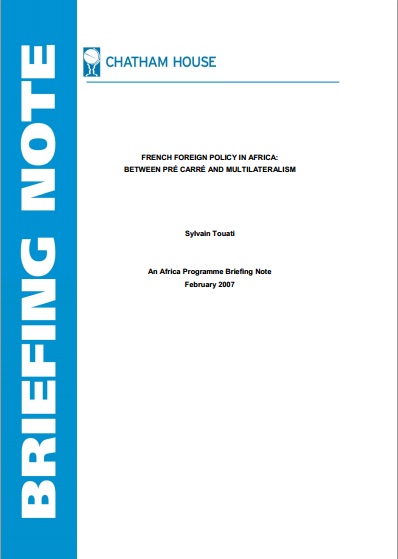French Foreign Policy in Africa: Between Pré Carré and Multilateralism

France"s monopoly of Africa is under threat. The last 50 years have seen the French battling to hold on to the ‘privileged relationship" with their former colonial empire, and a number of factors have forced the once imperial power into redefining its affiliation with ex-colonies, such as new laws on aid distribution, the integration of the EU and modern economic reforms.
In the post-Cold War era, ‘multilateralism" has become the latest political buzzword, and in its wake a notable shift in French policy in Africa has emerged. This shift, combined with a new generation of French politicians claiming to herald a fresh approach, might suggest that changes are on the way.
As this paper will discuss, however, France has been reluctant to adapt. Certain members of the French elite have benefited from neo-colonial models and are in no hurry to normalise dealings; it"s instructive, therefore, to examine what adjustments have come out of multilateralism and if a new class of politicians really can bring about change.

Available in:
Regions and themes
Share
Download the full analysis
This page contains only a summary of our work. If you would like to have access to all the information from our research on the subject, you can download the full version in PDF format.
French Foreign Policy in Africa: Between Pré Carré and Multilateralism
Related centers and programs
Discover our other research centers and programsFind out more
Discover all our analysesAnglo-Kenyan Relations (1920-2024) : Conflict, Alliance and a Redemptive Arc
This article provides an evidentiary basis for postcolonial policy in its analysis of Anglo-Kenyan relations in a decolonization era.
When City Diplomacy Meets Geopolitics: A Framework to Help Cities Navigate Geopolitical Risk
Crises and the increasing polarization of international relations make political risk analysis an indispensable resource for internationally active public and private entities.
The United Nations Mission in Congo or the exemplary uselessness of the United Nations peacekeepers
During the M23 conflict in 2012-2013 in the Democratic Republic of Congo (DRC), the United Nations (UN) took the diplomatic initiative (by initiating the Addis Ababa agreement) and the military initiative (by launching a coordinated counter-offensive with the Congolese army). Since the resurgence of this conflict in 2022, the United Nations, which still has more than 10,000 peacekeepers deployed in eastern DRC, no longer plays any role.
Rebooting Italy's Africa Policy: Making the Mattei Plan Work
Against the backdrop of increasing anti-French rhetoric across parts of Francophone Africa, the relative failure of the counterinsurgency operation in the central Sahel (Operation Barkhane) and diplomatic rifts with several Sahelian countries, Paris has been rethinking its relationship with the continent for several years now. As a former imperial power that has seen its colonial domain in Africa gain independence between 1956 (Morocco-Tunisia) and 1977 (Djibouti), France has invented two successive roles for itself in Africa since 1960, particularly in French-speaking sub-Saharan Africa.








